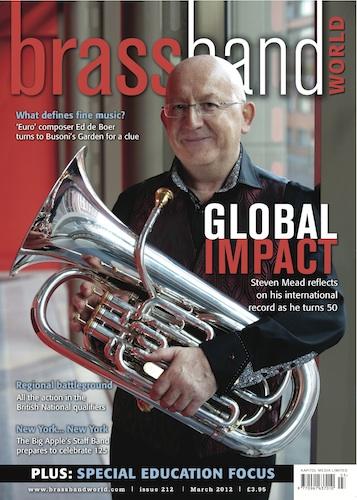In the current issue of Brass Band World magazine, March 2012 there is an article that the magazine commissioned regarding my 50th birthday! The editor Philip Harper did a really fine job putting together several conversations into one article, and photographer Ian Clowes made the cover photograph.
 Here is the article, with many thanks to Brass Band World magazine:
Here is the article, with many thanks to Brass Band World magazine:
Amazing as it sounds, Steven Mead celebrated his half-century a few weeks ago. He met up recently with BBW Editor Philip Harper to talk about a life of travelling with the euphonium.
In the great scheme of things, 50 years might not be such a long time. But a lot can change in that time, a fact to which Steven Mead can easily attest. "When I applied to study at the Royal Academy of Music in 1980, I can clearly remember getting a letter back saying ‘we're sorry, we can't accept you as we don't recognise the euphonium as a solo instrument'. This was after my high school teacher had been telling me for years that I couldn't possibly make a career from the euphonium!" Now 30 years later, and Steven has indeed made a career from the euphonium, whilst also elevating its status from a ‘not recognised' instrument to one firmly embedded in the music curriculum of institutions all over the world. "I've always, from the start, had a feeling that there's a ‘job to be done' regarding the profile of the euphonium. For example, when David Childs made the final of the BBC Young Musician of the Year in 2000 we had already had a big public battle with the BBC just to get the instrument into the competition. Now the euphonium's reach is spreading across the globe with, for example, the first national euphonium solo competition due to take place in China in 2013, the first Chinese euphonium student at the Royal Northern, and the euphonium now finding its way onto academic syllabuses in Germany and Italy."
Despite these years of euphonium evangelism and all the closed doors which must have been encountered on the way, Steven shows absolutely no sign of slowing down or losing enthusiasm. When we met in the cafe of the Royal Northern College of Music (RNCM), the almost childlike glint of glee in his eyes was clear to witness - this is a man who adores what he does. "Now I've reached this stage in my career I don't feel like I'm fighting a battle anymore," he confided. "I just feel incredibly fortunate to be doing this, and now I'm at a place where I really can't imagine not playing, or not travelling." The roll call of destinations for Steven's musical travels reads like an A-Z of the world: Switzerland, Holland, Spain, Malta, Germany, America, Peru, France, China, Lithuania, Italy, Russia, Norway, Japan and Venezuela, to name but a few of his engagements in the last 12 months alone! Following Steven's travels through social media sites, I am struck by how quickly he seems to hop from one place to another. "I actually had a competition on Facebook for people to try and guess how many miles I had actually covered in the previous year," he revealed. "The total, believe it or not, was 132,000. That's a lot of miles! I always make all the travel arrangements myself, and I know every airline on every route. People are generally very understanding of my requirement to carry a fairly large musical instrument - I always try and board with my ‘gig bag and a smile'. Ryanair is the only company which makes me book a separate seat for my instrument. Not such a budget airline!"
With variety supposedly the spice of life, Steven told me how this kind of jetsetting schedule had now become an enjoyable form of normality to him. "Every day is different. I suppose the one constant in my life for 22 years now has been teaching at the Royal Northern College of Music and I go there once or twice a week. On those days the alarm goes off at 5am and I'm out of the house by 5.30, arriving in Manchester by about 7.20, beating the crazy rush-hour traffic and leaving me time for a little practice before lessons start. I often teach for 10 or eleven hours before driving the 105 miles back home again. I catch up with some emails before I finish off with more practice, starting around 10pm and going on until midnight. I've been burning the candle at both ends for many years and so it really doesn't seem exceptional to me at all. When I'm abroad it could be travelling in the morning, checking into a hotel, rehearsing or practising in the afternoon, perhaps some teaching or a masterclass followed by an evening concert and then a reception. For sure I need a lot of energy and need to stay focused with these kinds of schedules." I asked if all work and no play makes Steven a dull boy, but he was happily able to confirm the odd moment of relaxation too. "Yes, I do occasionally have a full day at home which is really wonderful and then I can take time to listen to music, catch up on non-urgent correspondence, take a walk or sometimes a jog around my lovely village of Fenny Drayton. The village is surrounded by fields and so it's incredibly therapeutic for me to enjoy the open air after spending most of my time working in cities."
I wonder whether this kind of career is one which Steven recommends to his RNCM students, or is one which they ask about. "Embarking on a solo career is not something you can do overnight but for those crazy enough to even imagine it, it demands absolute dedication, forward planning, great organisational skills and sacrifice. In reality a professional career with the euphonium would involve some professional playing, perhaps in a military band, some teaching, some solo engagements, and this on the back of a successful career with a top brass band where your reputation and name can be established. Actually, I look at past students of mine like Mark Bousie or Philippe Schwarz and they seem now to be in the perfect situation - they're qualified, they have a good job and they're both playing with great bands [Foden's and Grimethorpe respectively]."
With this in mind, I asked Steven how it all started for him. "I have very good childhood memories when my grandfather and my father, Rex, mentored me from the age of ten. I can remember when I got to about 12 years old, there was just something about the sound of the euphonium, as played by legends such as Barrie Perrins, which absolutely captivated me. I was always a keen singer, and when my voice broke, the euphonium became my new singing voice. After the failure with the Royal Academy, I studied at the University of Bristol under Derek Bourgeois, John Fletcher and John Iveson, as well as joining the Stanshawe Band. Then, in 1982 I got a call from Howard Snell inviting me to join Desford." Steven's great respect for Howard is obvious from his body language, and as we are about to attend the RNCM Festival Foden's concert, at which Snell is conducting, talking about his influence is particularly appropriate. "He was actually very encouraging and supportive which was hugely important for my development at that time. In the end he trusted me to lead the bottom of the band, and I even ended up staying at his house for six months!"
Steven confided in me later that he had managed to meet Howard Snell after the concert, chatting with him for about half an hour and thanking him for his invaluable assistance during those early years that laid the foundations for the diverse career of playing the euphonium all over the world which he now enjoys.
The big one for Steven Mead this year is the International Tuba and Euphonium Conference (ITEC) which will take place in Linz, Austria from 25 - 30 June, and of which Steven is the Artistic Director. "Two years ago the ITEC was held in Arizona, USA. I was talking to Hubert Gurtner, the representative for the European Brass Band Association in Linz, who asked me whether I thought the ITEC could actually happen in Linz. I said I would look into it, and he asked me then whether I could be the Artistic Director - it all happened within ten days! I organised six British conferences between 1994 and 2001, so I knew how to do it and I really wanted to see the ITEC in central Europe. I realised this would be in my 50th Birthday year and really felt like I wanted to give something back." As well as international low brass stars such as Brian Bowen, Gary Curtin, Tormod Flaten, Shoichiro Hokazono, Demondrae Thurman, Glenn van Looy, Oystein Baadsvik and Les Neish, there will also be a special guest for the final two days, jazz trombonist Wycliffe Gordon. Dozens of new pieces will get their first performances and Linz local Thomas Doss has written a special signature piece for the event, which also features Mnozil Brass and Brass Band Oberösterreich. Quite a mouthwatering programme in anyone's book!
‘Giving something back' is clearly a matter about which Steven feels compelled to think more and more these days, and I asked him about the kind of legacy he'd like to think he is creating. "I suppose by the time you get to a certain point in your career, in my case maybe now around the age of 50 it's inevitable, you do think about your contribution to the music world, and in my case specifically the euphonium world. I've been fortunate to be able to sustain quite an intense focus on my work for many years and with all the recordings I've made and over 400 new works commissioned I'd like to think that there is a body of work that people can look to and perhaps gain inspiration and motivation from themselves. To some extent the last ten years of my career have been fairly easy - once you become established you simply have to deliver the goods when it matters! - but in the 15 or 20 years before that, undoubtedly my passion for the euphonium and to popularise it drove me forwards. It's been a huge privilege to take the euphonium to countries and musical societies where it was completely unknown, as well as developing its profile generally. I remember clearly my first ever visit to the USA in July 1990, and during one part of that visit I was sitting in a car with Jim and Bill Gray who told me of their dream to form a brass band in Michigan. The Brass Band of Battle Creek has just celebrated its 20th Anniversary and I couldn't be more proud than to have been the band's principal euphonium for this entire time."
So where does this desire to spread the euphonium gospel around the world come from? "I don't really know. But what I do know is that during my teenage years, pretty much every single piece of musical advice I received was along the lines of ‘do something instead of play euphonium because it's not possible to have a career with this instrument', so whether I either consciously or subconsciously sought to prove these voices wrong I'm not sure."
Having spent most of our time discussing Steven's first 50 years, we ended by thinking into the future as I asked him where he sees himself in another 20 years time. "As I'm doing a job that I absolutely adore, the honest answer is to try and keep doing this as long as possible. None of us can be sure what the future holds but I don't see any signs of my love of playing, and perhaps more importantly practice, diminishing, and even if the travelling sometimes gets quite wearing I still think I have the best job in the world. For sure it's not something that suits everyone and you do have to get used to your own company, but I'm well used to it now! I have to keep my fingers crossed that there are no other travel scares especially with airline travel because that would make my job significantly harder. How did those travelling soloists in the 18th and 19th Centuries do it? In terms of when it's time to stop, I hope I realise before other people do!"
For someone at the top of their game and enjoying life as much as Steven obviously is, there's no reason to contemplate slowing down just yet. BBW wishes you a Happy Birthday, Steven!

